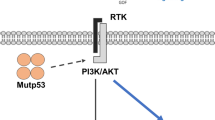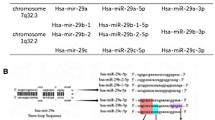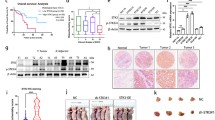Abstract
Derlin-1 is overexpressed in many types of solid tumors and plays an important role in cancer progression. However, the expression pattern and functions of Derlin-1 in human colon cancer are not fully understood. In the present study, we examined Derlin-1 expression in colon cancer cell lines and human tissues and investigated its role in colon cancer. We found that Derlin-1 expression was increased significantly in colon cancer tissues and its overexpression correlated with the tumor differentiation, Dukes stage, invasion, lymph node metastasis, distant metastasis, and poor overall survival. The silencing of Derlin-1 by shRNA led to the growth inhibition of colon cancer cells, which were associated with the promotion of apoptosis. Furthermore, Derlin-1 silencing significantly inhibited the activation of the PI3K/AKT signaling pathway. Taken together, our results showed that Derlin-1 is overexpressed in colon cancer and promotes proliferation of colon cancer cells. Derlin-1 may be a potential therapeutic target for the treatment of colon cancer.





Similar content being viewed by others
Abbreviations
- ER:
-
Endoplasmic reticulum
- NSCLC:
-
Non-small cell lung cancer
- UPR:
-
Unfolded protein response
References
Tenesa A, Dunlop MG (2009) New insights into the aetiology of colorectal cancer from genome-wide association studies. Nat Rev Genet 10:353–358. doi:10.1038/nrg2574
Schweiger MR, Hussong M, Rohr C, Lehrach H (2013) Genomics and epigenomics of colorectal cancer. Wiley Interdiscip Rev Syst Biol Med 5:205–219. doi:10.1002/wsbm.1206
Chen SF, Wu CH, Lee YM, Tam K, Tsai YC, Liou JY, Shyue SK (2013) Caveolin-1 interacts with Derlin-1 and promotes ubiquitination and degradation of cyclooxygenase-2 via collaboration with p97 complex. J Biol Chem 288:33462–33469. doi:10.1074/jbc.M113.521799
Wang F, Olson EM, Shyng SL (2012) Role of Derlin-1 protein in proteostasis regulation of ATP-sensitive potassium channels. J Biol Chem 287:10482–10493. doi:10.1074/jbc.M111.312223
Suzuki M, Otsuka T, Ohsaki Y, Cheng J, Taniguchi T, Hashimoto H, Taniguchi H, Fujimoto T (2012) Derlin-1 and UBXD8 are engaged in dislocation and degradation of lipidated ApoB-100 at lipid droplets. Mol Biol Cell 23:800–810. doi:10.1091/mbc.E11-11-0950
Wang J, Hua H, Ran Y, Zhang H, Liu W, Yang Z, Jiang Y (2008) Derlin-1 is overexpressed in human breast carcinoma and protects cancer cells from endoplasmic reticulum stress-induced apoptosis. Breast Cancer Res 10:R7. doi:10.1186/bcr1849
Dong QZ, Wang Y, Tang ZP, Fu L, Li QC, Wang ED, Wang EH (2013) Derlin-1 is overexpressed in non-small cell lung cancer and promotes cancer cell invasion via EGFR-ERK-mediated up-regulation of MMP-2 and MMP-9. Am J Pathol 182:954–964. doi:10.1016/j.ajpath.2012.11.019
Hu D, Ran YL, Zhong X, Hu H, Yu L, Lou JN, Sun LX, Yang ZH (2006) Overexpressed Derlin-1 inhibits ER expansion in the endothelial cells derived from human hepatic cavernous hemangioma. J Biochem Mol Biol 39:677–685
Ran Y, Hu H, Hu D, Zhou Z, Sun Y, Yu L, Sun L, Pan J, Liu J, Liu T, Yang Z (2008) Derlin-1 is overexpressed on the tumor cell surface and enables antibody-mediated tumor targeting therapy. Clin Cancer Res 14:6538–6545. doi:10.1158/1078-0432.CCR-08-0476
Klopfleisch R, Gruber AD (2009) Derlin-1 and stanniocalcin-1 are differentially regulated in metastasizing canine mammary adenocarcinomas. J Comp Pathol 141:113–120. doi:10.1016/j.jcpa.2008.09.010
Klopfleisch R, Schutze M, Linzmann H, Brunnberg L, Gruber AD (2010) Increased Derlin-1 expression in metastases of canine mammary adenocarcinomas. J Comp Pathol 142:79–83. doi:10.1016/j.jcpa.2009.06.006
Xu L, Wang ZH, Xu D, Lin G, Li DR, Wan T, Guo SL (2014) Expression of Derlin-1 and its effect on expression of autophagy marker genes under endoplasmic reticulum stress in lung cancer cells. Cancer Cell Int 14:50. doi:10.1186/1475-2867-14-50
Ran Y, Jiang Y, Zhong X, Zhou Z, Liu H, Hu H, Lou JN, Yang Z (2006) Identification of derlin-1 as a novel growth factor-responsive endothelial antigen by suppression subtractive hybridization. Biochem Biophys Res Commun 348:1272–1278. doi:10.1016/j.bbrc.2006.07.186
Han YS, Lee JH, Lee SH (2015) Fucoidan inhibits the migration and proliferation of HT-29 human colon cancer cells via the phosphoinositide-3 kinase/Akt/mechanistic target of rapamycin pathways. Mol Med Rep. doi:10.3892/mmr.2015.3804
Fu R, Yang P, Wu HL, Li ZW, Li ZY (2014) GRP78 secreted by colon cancer cells facilitates cell proliferation via PI3 K/Akt signaling. Asian Pac J Cancer Prev 15:7245–7249
Liu YZ, Wu K, Huang J, Liu Y, Wang X, Meng ZJ, Yuan SX, Wang DX, Luo JY, Zuo GW, Yin LJ, Chen L, Deng ZL, Yang JQ, Sun WJ, He BC (2014) The PTEN/PI3 K/Akt and Wnt/beta-catenin signaling pathways are involved in the inhibitory effect of resveratrol on human colon cancer cell proliferation. Int J Oncol 45:104–112. doi:10.3892/ijo.2014.2392
Bi M, Naczki C, Koritzinsky M, Fels D, Blais J, Hu N, Harding H, Novoa I, Varia M, Raleigh J, Scheuner D, Kaufman RJ, Bell J, Ron D, Wouters BG, Koumenis C (2005) ER stress-regulated translation increases tolerance to extreme hypoxia and promotes tumor growth. EMBO J 24:3470–3481. doi:10.1038/sj.emboj.7600777
Edagawa M, Kawauchi J, Hirata M, Goshima H, Inoue M, Okamoto T, Murakami A, Maehara Y, Kitajima S (2014) Role of activating transcription factor 3 (ATF3) in endoplasmic reticulum (ER) stress-induced sensitization of p53-deficient human colon cancer cells to tumor necrosis factor (TNF)-related apoptosis-inducing ligand (TRAIL)-mediated apoptosis through up-regulation of death receptor 5 (DR5) by zerumbone and celecoxib. J Biol Chem 289:21544–21561. doi:10.1074/jbc.M114.558890
Shimodaira Y, Takahashi S, Kinouchi Y, Endo K, Shiga H, Kakuta Y, Kuroha M, Shimosegawa T (2014) Modulation of endoplasmic reticulum (ER) stress-induced autophagy by C/EBP homologous protein (CHOP) and inositol-requiring enzyme 1alpha (IRE1alpha) in human colon cancer cells. Biochem Biophys Res Commun 445:524–533. doi:10.1016/j.bbrc.2014.02.054
Basile V, Belluti S, Ferrari E, Gozzoli C, Ganassi S, Quaglino D, Saladini M, Imbriano C (2013) bis-dehydroxy-curcumin triggers mitochondrial-associated cell death in human colon cancer cells through ER-stress induced autophagy. PLoS One 8:e53664. doi:10.1371/journal.pone.0053664
Jakobsen CH, Storvold GL, Bremseth H, Follestad T, Sand K, Mack M, Olsen KS, Lundemo AG, Iversen JG, Krokan HE, Schonberg SA (2008) DHA induces ER stress and growth arrest in human colon cancer cells: associations with cholesterol and calcium homeostasis. J Lipid Res 49:2089–2100. doi:10.1194/jlr.M700389-JLR200
Nishitoh H, Kadowaki H, Nagai A, Maruyama T, Yokota T, Fukutomi H, Noguchi T, Matsuzawa A, Takeda K, Ichijo H (2008) ALS-linked mutant SOD1 induces ER stress- and ASK1-dependent motor neuron death by targeting Derlin-1. Genes Dev 22:1451–1464. doi:10.1101/gad.1640108
Cho S, Lee M, Jun Y (2013) Forced interaction of cell surface proteins with Derlin-1 in the endoplasmic reticulum is sufficient to induce their dislocation into the cytosol for degradation. Biochem Biophys Res Commun 430:787–792. doi:10.1016/j.bbrc.2012.11.068
Cho S, Kim BY, Ahn K, Jun Y (2013) The C-terminal amino acid of the MHC-I heavy chain is critical for binding to Derlin-1 in human cytomegalovirus US11-induced MHC-I degradation. PLoS One 8:e72356. doi:10.1371/journal.pone.0072356
Acknowledgments
The work was supported by the National Natural Science Foundation of China (81172266), the Life Health Technology Foundation of Jiangsu province (BL2012031), and the Natural Science Foundation of Jiangsu province (BK2011859) to ZNF.
Author information
Authors and Affiliations
Corresponding authors
Additional information
Xueming Tan and Xiaolu He have contributed equally to this work.
Rights and permissions
About this article
Cite this article
Tan, X., He, X., Jiang, Z. et al. Derlin-1 is overexpressed in human colon cancer and promotes cancer cell proliferation. Mol Cell Biochem 408, 205–213 (2015). https://doi.org/10.1007/s11010-015-2496-x
Received:
Accepted:
Published:
Issue Date:
DOI: https://doi.org/10.1007/s11010-015-2496-x




